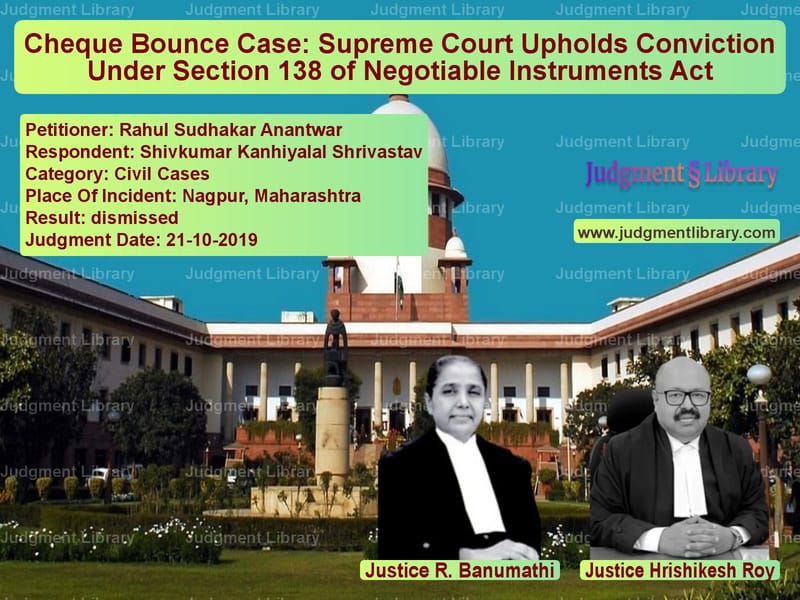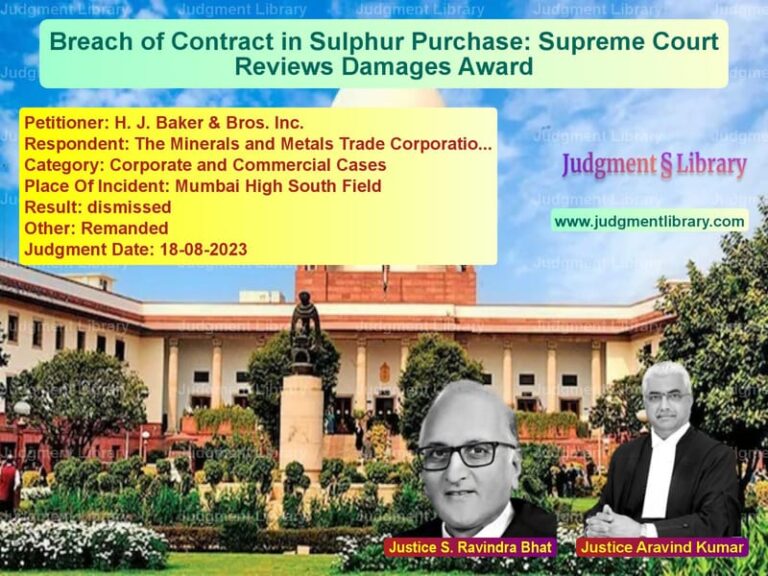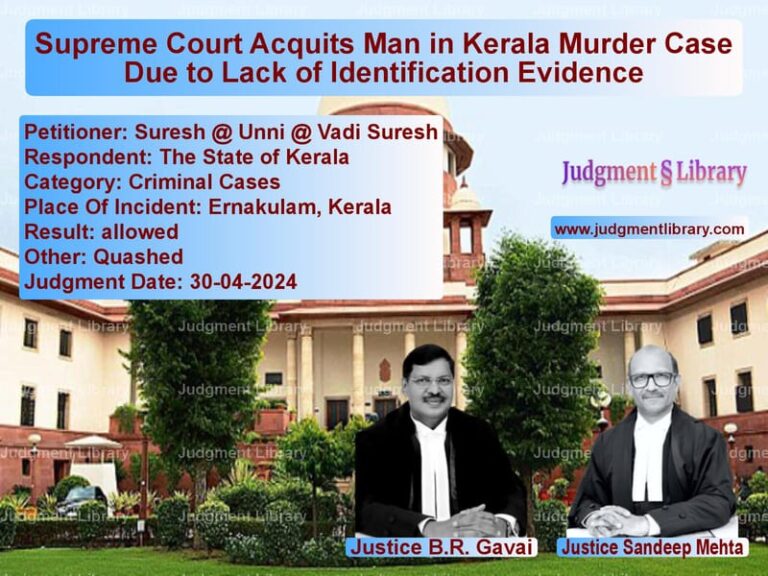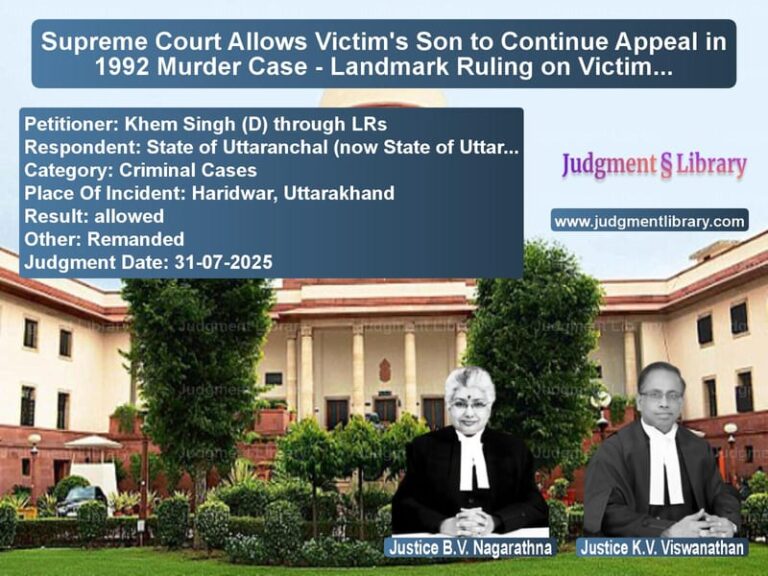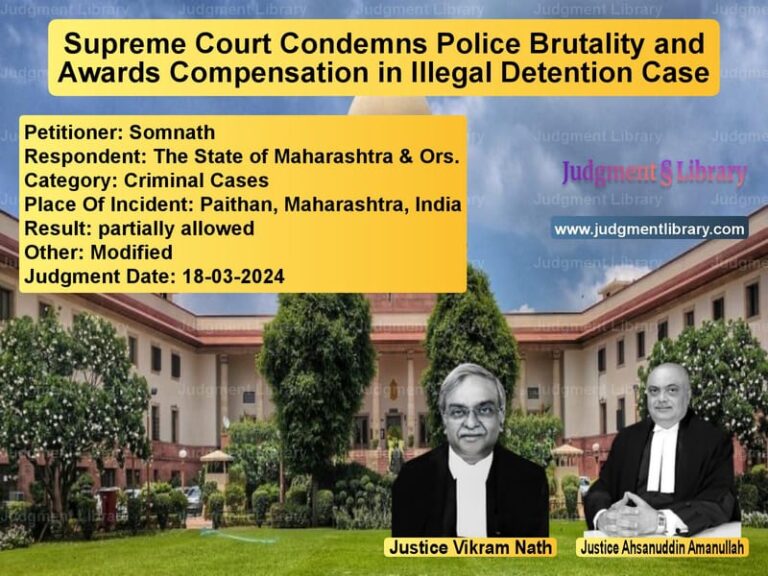Cheque Bounce Case: Supreme Court Upholds Conviction Under Section 138 of Negotiable Instruments Act
The case of Rahul Sudhakar Anantwar vs. Shivkumar Kanhiyalal Shrivastav revolves around a dispute under Section 138 of the Negotiable Instruments Act, 1881, related to the dishonor of a cheque issued by the appellant. The Supreme Court, in its judgment dated October 21, 2019, upheld the conviction of the appellant and modified the fine imposed by the High Court.
Background of the Case
Agreement of Sale and Cheque Issuance
The appellant-accused and the respondent-complainant entered into an Agreement of Sale on February 28, 2012. Under this agreement:
- The appellant agreed to sell a property owned by his mother to the respondent.
- The agreed sale consideration was Rs. 25,00,000.
- The respondent paid an advance amount of Rs. 2,50,000.
Due to certain circumstances, the agreement could not be executed, and the appellant issued a cheque for Rs. 2,50,000 in favor of the respondent to refund the earnest money.
Cheque Dishonor and Legal Notice
The respondent presented the cheque for clearance, but it was returned by the bank with the endorsement “Account Closed”. The respondent then issued a legal notice on August 23, 2013, demanding repayment. When the appellant failed to make the payment, the respondent filed a complaint under Section 138 of the Negotiable Instruments Act.
Trial Court Decision
- The trial court acquitted the appellant on the ground that the cheque was issued from an account belonging to a firm named Synergy and Solution Incorporation, which was registered in the name of one Vipin Dhopte and not the appellant.
- The court observed that the firm’s account had been closed since March 11, 2006, due to a negative balance.
- The trial court ruled that the respondent failed to prove beyond a reasonable doubt that the accused was responsible for the dishonored cheque.
High Court Reversal
The respondent appealed against the acquittal before the Bombay High Court (Nagpur Bench). The High Court held that:
- The appellant did not dispute his signature on the cheque.
- The appellant failed to provide evidence proving that the cheque was stolen or misused.
- The statutory presumption under Section 139 of the N.I. Act was not rebutted satisfactorily by the appellant.
- The cheque was issued to discharge a legally enforceable debt.
Consequently, the High Court convicted the appellant under Section 138 and imposed a fine of Rs. 5,00,000 along with costs of Rs. 20,000, totaling Rs. 5,20,000.
Supreme Court’s Decision
Appellant’s Arguments
- The appellant argued that he had no connection with the cheque as it was drawn from an account belonging to a different entity.
- He claimed that the cheque was stolen from his office table and misused.
- The trial court had correctly acquitted him, and the High Court erred in reversing the decision.
Respondent’s Arguments
- The appellant had signed the cheque, and there was no evidence to prove that it was stolen or issued without authorization.
- Under Section 139 of the N.I. Act, there is a statutory presumption that a cheque issued is against a legally enforceable debt unless proven otherwise.
- The appellant failed to provide any substantial evidence to rebut this presumption.
Supreme Court’s Observations
- The appellant’s signature on the cheque was undisputed.
- There was no credible evidence supporting the claim that the cheque was stolen or issued without the appellant’s knowledge.
- The statutory presumption under Section 139 was not effectively rebutted by the appellant.
- The High Court rightly convicted the appellant under Section 138.
Modification of Fine
The Supreme Court, however, found the fine amount imposed by the High Court excessive. The fine was reduced from Rs. 5,00,000 to Rs. 2,80,000, plus Rs. 20,000 in costs, making a total of Rs. 3,00,000. The court ordered:
- Rs. 2,50,000 plus Rs. 20,000 (costs) had already been received by the respondent.
- Rs. 30,000 to be paid to the respondent.
- The balance amount of Rs. 2,20,000, along with accrued interest, to be returned to the appellant.
Key Takeaways from the Judgment
- Presumption Under Section 139 of N.I. Act: The Supreme Court reaffirmed that once a cheque is issued, there is a presumption in favor of the holder that it was issued for a legally enforceable debt.
- Burden of Proof on the Accused: The appellant failed to provide sufficient evidence to rebut the statutory presumption.
- Reversal of Acquittal: The judgment highlights that higher courts can overturn acquittals if evidence shows a wrongful decision by the trial court.
- Reasonable Fine: The Supreme Court reduced the fine, emphasizing that penalties should be proportionate to the offense.
Conclusion
This case underscores the importance of maintaining financial integrity and the consequences of issuing a dishonored cheque. The Supreme Court’s ruling reinforces the legal principle that individuals must ensure sufficient funds before issuing cheques, failing which they may face criminal penalties. The judgment also serves as a reminder that courts will not hesitate to reverse acquittals if statutory presumptions are not effectively countered.
Petitioner Name: Rahul Sudhakar Anantwar.Respondent Name: Shivkumar Kanhiyalal Shrivastav.Judgment By: Justice R. Banumathi, Justice Hrishikesh Roy.Place Of Incident: Nagpur, Maharashtra.Judgment Date: 21-10-2019.
Don’t miss out on the full details! Download the complete judgment in PDF format below and gain valuable insights instantly!
Download Judgment: Rahul Sudhakar Anant vs Shivkumar Kanhiyalal Supreme Court of India Judgment Dated 21-10-2019.pdf
Direct Downlaod Judgment: Direct downlaod this Judgment
See all petitions in Cheque Dishonour Cases
See all petitions in Contract Disputes
See all petitions in Debt Recovery
See all petitions in Damages and Compensation
See all petitions in Judgment by R. Banumathi
See all petitions in Judgment by Hrishikesh Roy
See all petitions in dismissed
See all petitions in supreme court of India judgments October 2019
See all petitions in 2019 judgments
See all posts in Civil Cases Category
See all allowed petitions in Civil Cases Category
See all Dismissed petitions in Civil Cases Category
See all partially allowed petitions in Civil Cases Category

